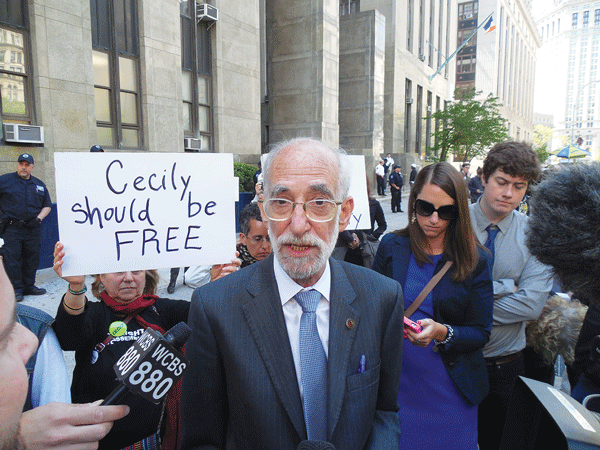
BY GERARD FLYNN | Cecily McMillan, an Occupy Wall Street activist who elbowed a police officer in the face at a protest in Zuccotti Park, was sentenced Monday in State Supreme Court to 90 days in jail, with five years probation.
McMillan, a 25-year-old New School graduate student, will also pay a fine of $5,000 and undergo mental health evaluation after being convicted of assault in the St. Patrick’s Day incident two years ago.
An inmate at Rikers Island since her recent conviction, McMillan will get credit for time served, her lawyer Martin Stolar said. He said, with good behavior, he expects her to be released within 60 days. Due to what the lawyer branded an unfair trial, plus the serious consequences that a felony conviction carries, an appeal is pending, he said.
While his client “was disappointed,” Stolar said, he added she was “relieved it wasn’t two years” in jail. Though, he added, after the sentencing, “she is not happy about going back to Rikers Island.”
McMillan had been facing two to seven years in prison for the assault on Police Officer Grantley Bovell. The officer was leading her out of the Lower Manhattan park where she had gathered with other activists to commemorate the Occupy Wall Street movement’s six-month anniversary. Bovell suffered minor injuries and was off duty for a couple of weeks.
At trial, McMillan claimed she acted in self-defense when Bovell grabbed her breasts, leaving her with a large bruise. Her defense team said she was severely beaten by police officers, suffering extensive cuts and bruises, followed by a seizure and subsequent hospitalization.
“It was an unconscious reaction to having her breasts pulled and there was no intent to cause injury,” Stolar said, speaking after the sentencing. “She didn’t even know it was a police officer who grabbed her breasts. She just reacted.”
Prosecutors, however, disagreed and claimed her injuries were self-inflicted.
Dozens of court officers ringed the courtroom Monday morning as McMillan, dressed in a hot pink dress and pumps, was led out in a handcuffs.
Her lawyers had asked Judge Ronald Zweibel to release McMillan on probation. Nine of the 12 jurors who convicted her agreed and sent a letter to the judge to that effect.
In a statement before the court, McMillan asked for leniency and told the judge that, while she deplores violence, “I cannot confess to a crime I did not commit.”
Zweibel, however, rejected calls for her swift release and told the packed courtroom, “A civilized society must not allow an assault to be committed under the guise of civil disobedience.”
The jury, he noted, “rejected the defendant’s version of events.”
However, he said, in deciding against the maximum jail time, “The court finds that a lengthy sentence would not serve the interests of justice in this case.”
McMillan’s trial has gained national and international attention. Members of the Russian insurgent rock band Pussy Riot recently visited her in prison and a letter-writing campaign has garnered close to 170,000 signatures worldwide.
While the verdict was being read, scores of supporters gathered across the street from the courthouse, where they sang “We Shall not Be Moved.”
They were joined after the decision by Councilmember Ydanis Rodriguez, who was arrested during the Occupy protests, and was among a handful of councilmembers calling for leniency for McMillan on the steps of City Hall last week. He said he was “pleased” with her sentence.
McMillan’s trial, he said, symbolizes attempts by the state to chill free speech and deter nascent activists from getting involved in social justice issues.
Rodriguez called for changes in how the police department can with such ease be allowed to charge protesters with assault on a police officer. He noted, to raucous cheers, that “not one police officer has been found guilty of assaulting a member of Occupy Wall Street.”
Stolar reminded the crowd that Manhattan District Attorney Cy Vance, Jr. is an elected official and that voters could register their displeasure with the verdict at the ballot box. He said that while Mayor de Blasio was in no legal position to intervene, a letter of support “would have been appreciated.”
McMillan’s “surrogate mother,” L Nyrobi Moss, said that while McMillan was somewhat prepared for the verdict, she was also shocked that she would be returning to Rikers Island.
When asked what members of Occupy Wall Street can do now post-sentencing, Stolar said, “Point out that income inequality in this country is a hallmark of a lot of other social and economic problems that we have. That’s what Occupy Wall Street did and will continue to do.”
That goes for McMillan, too, he said, “because that’s who she is — political to the core.”
Erin Duggan Kramer, deputy chief of staff for the Manhattan District Attorney’s Office, issued the following statement:
“The District Attorney’s Office will always uphold the right to freedom of speech and the right to peaceably assemble. These constitutional protections are bedrocks of our personal liberties, the passionate exercise of which is deeply entrenched in our city’s culture. We also have a duty to uphold the law when someone’s action crosses the line between a protected freedom and a crime against another. An unprecedented amount of time and care has been given to the mass arrest cases that arose during the Occupy Wall Street movement. More than 2,600 cases came into the D.A.’s Office — from violations to felonies — and each case was individually reviewed to ensure that only those whose actions provably violated the law were charged. Great leniency was offered first-time, nonviolent offenders and the overwhelming number of cases were justly resolved with adjudications in contemplation of dismissal, in which charges are dismissed and sealed from a defendant’s record after six months. This defendant chose to take her case to trial, and was convicted by a jury of her peers for a violent felony.”































